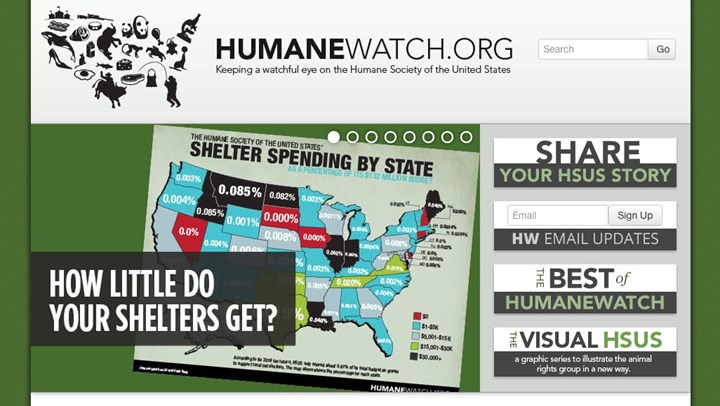
by Frank Miniter - Thursday, December 21, 2017

An empowering thing about First Amendment-protected free speech is it allows us to call someone, or any organization for that matter, precisely what they are. If they are liars or hypocrites we can say so. Even a defamation suit will be tossed out of court if a jury of our peers concludes, Yeah, that’s honest.
Enter HumaneWatch, a nonprofit group run by the Center for Consumer Freedom (CCF)—also known as the Center for Organizational Research and Education. HumaneWatch says it is a consumer-protection group “Keeping a Watchful Eye on the Humane Society of the United States” (HSUS).
HumaneWatch has been pricking the HSUS balloon since 2010. They’ve stepped in because the media has shown little interest in telling people the hard facts about HSUS’s real agenda.
HumaneWatch spends its time and resources calling HSUS—the largest anti-hunting group in the United States—what it is: an activist, anti-hunting, animal-rights shell of a nonprofit that masquerades as a group running, or at least primarily funding, animal shelters. HSUS has long raked in donations, some of which are used for campaigns to close hunting seasons, by fooling well-intentioned people into giving it money. Uninformed people assume HSUS will use its donations to neuter, shelter or otherwise help all the sad-eyed cats and dogs HSUS puts in its ads.
To tell people the truth, HumaneWatch now has a series of videos and ads running on Youtube, Facebook and news outlets, such as on FOX News. A recent YouTube video from HumaneWatch quickly got more than one million views, so the word is getting out.
They aren’t pulling their punches. For example, one ad from HumaneWatch that is running on Politico asks “Have You Seen This Predator?” and shows a WANTED poster featuring HSUS President Wayne Pacelle; beside Pacelle’s photo is the charge that HSUS only gives “1 percent” of its funds annually to pet shelters.
“We get the one percent figure,” says Will Coggin, research director for CCF, “by going through HSUS’ publicly attainable tax returns, as they are a nonprofit group, and adding up all their grants. Year after year we’ve found that HSUS gives about one percent of its $80 to $100 million dollars in donations to animal shelters.”
When asked if HSUS has maybe upped this percentage since HumaneWatch started calling it out for doing so, Coggin said, “Incredibly, no. But we know our efforts have had an impact; for example, last year sources tell us HSUS was forced to lay off 55 people.”
Coggin says his group’s ads target the people who give the most to HSUS. “The typical person who donates to HSUS is female and middle class, so our ads on social media and that run in various publications target this audience. We want people to know the truth about HSUS, so we tell them if they want to help homeless pets they should give to their local animal shelters.”
CCF, which runs HumaneWatch, argues that it is performing a critical truth-telling function the media just won’t do. HumaneWatch says that “even charities with the best reputations aren’t immune to making mistakes. In the wake of 9/11, local Red Cross chapters kept buckets of cash instead of earmarking the funds for Ground Zero and Pentagon recovery efforts. Heads rolled. And the former chief executive of the United Way’s Washington, D.C., chapter went to prison in 2004 following an accounting scandal.”
Critics of CCF point out that it takes money from restaurant groups and other associations that fund CCF simply to defend their businesses from groups like HSUS. CCF says that’s true, but it also takes donations from a lot of people who back their causes, and anyway, they wouldn’t have to defend the American way of life if the media wasn’t so one-sided.
HSUS, after all, does push its anti-hunting and even anti-meat agenda in Congress. In 2017 alone to date, HSUS spent $655,000 lobbying on Capitol Hill, according to OpenSecrets.org.
Pushing back with the bright light of truth against a group that portrays itself as an organization that primarily helps lost or homeless pets—but that actually spends peoples’ money pushing to outlaw hunting and much more—is an important public service.
■ ■ ■
Editor's Note: Frank Miniter is the author of "This Will Make a Man of You: One Man’s Search for Hemingway and Manhood in a Changing World." Miniter is also the author of the New York Times' Bestseller "The Ultimate Man’s Survival Guide," as well as "The Future of the Gun" and “The Politically Incorrect Guide to Hunting.”
E-mail your comments/questions about this site to:
[email protected]
